
- Researchers say hard liquor as well as beer and wine can raise the risk of a variety of concerns.
- However, a survey indicates that most people in the United States aren’t aware of these risks.
- Experts say it’s important to educate people about the links between alcohol and cancer risk.
Alcohol can raise your risk of cancer. But most Americans still don’t know it.
Despite new research that shows that all alcoholic beverages, including beer and wine, increase the risk of multiple types of cancer, people in the United States have a low awareness of this risk.
The new study, published in the journal Cancer Epidemiology, Biomarkers & Prevention, notes that there are seven cancer types that have been linked to alcohol consumption. These include cancers of the breast, mouth, and colon.
The link between alcohol use and cancer risk is something health officials have been pointing out for years.
The Centers for Disease Control and Prevention (CDC), for example, reports that drinking alcohol raises your risk of getting six kinds of cancer: mouth and throat, voice box (larynx), esophagus, colon and rectum, liver, and breast (in women).
Researchers concerned about alcohol and cancer link
William M.P. Klein, Ph.D., the new study’s senior author, is the associate director of the National Cancer Institute’s Behavioral Research Program.
He told Healthline that alcohol is a leading modifiable risk factor for cancer in the United States and that there needs to be more education so that people can make more informed decisions about drinking.
“We are concerned. The effects on behavior since the pandemic is that more people are drinking. Alcohol sales have gone up. That could lead to more cancers down the line,” Klein said.
Many people think that wine is good for you, Klein added, but it’s not the case.
“The evidence of that is very weak. There was the thought that red wine was good for you, but the bottom line is you would have to drink huge amounts of red wine to get the benefits and that would defeat the purpose,” he said.
The study’s authors suggest that interventions could include media campaigns, cancer warning labels, and patient-provider communications. Tailoring messages to desired audiences could help increase message relevance.
Klein says that the oncology community and physicians, in general, are beginning to embrace this information as well and an increasing number of doctors are telling their patients about this risk.
Data on alcohol-cancer link awareness
To assess Americans’ awareness of the links between alcohol and cancer, the scientists analyzed data from the 2020 Health Information National Trends Survey, encompassing survey responses from 3,865 adults.
Respondents were asked, “In your opinion, how much does drinking the following types of alcohol affect the risk of getting cancer?”
Responses were recorded for wine, beer, and liquor. Further questions assessed the respondents’ awareness of links between alcohol and heart disease. Researchers also asked respondents about their current alcohol intake.
The results showed that awareness of the alcohol-cancer link was highest for liquor, with 31% of U.S. adults being aware of the risk, followed by beer (25%) and wine (20%).
About 10% of U.S. adults said wine decreases cancer risk, while 2% said beer decreases risk, and less than 2% said liquor decreases risk.
More than 50% of U.S. adults reported not knowing how these beverages affected cancer risk.
U.S. adults who were aware that alcoholic beverages increased heart disease risk had higher adjusted predicted probabilities of being aware of the alcohol-cancer link.
Heart disease awareness followed similar patterns to cancer awareness, with 39%, 36%, and 25% of U.S. adults believing that liquor, beer, and wine, respectively, increased heart disease risk.
Older Americans have less awareness of risk
Older adults demonstrated lower awareness of alcohol as a risk factor for cancer.
Among U.S. adults over age 60, 15% were aware of the risk for wine; 17% for beer; and 23% for liquor.
By comparison, among U.S. adults aged 18 to 39, 26% were aware of the risk for wine; 33% for beer; and 39% for liquor.
Drinking status was not associated with awareness, with similar rates for non-drinkers, drinkers, and heavier drinkers.
‘The science is clear’
David Jernigan, Ph.D., who was not part of this study, is a professor of health law, policy and management at the Boston University School of Public Health.
He is perhaps best known for his approach to the issue of alcohol advertising, marketing, and promotion and its influence on younger people.
He told Healthline that this new study is a good way to educate people about the real dangers of alcohol.
“The science is clear: there is no safe level of drinking when it comes to cancer,” Jernigan said. “The risk starts rising the minute you start to drink. People have a right to have that information.”
Alcohol and Cancer Risk: Most Americans Aren't Aware of the Link
Source: Pinoy Lang Sakalam



0 (mga) komento:
Mag-post ng isang Komento